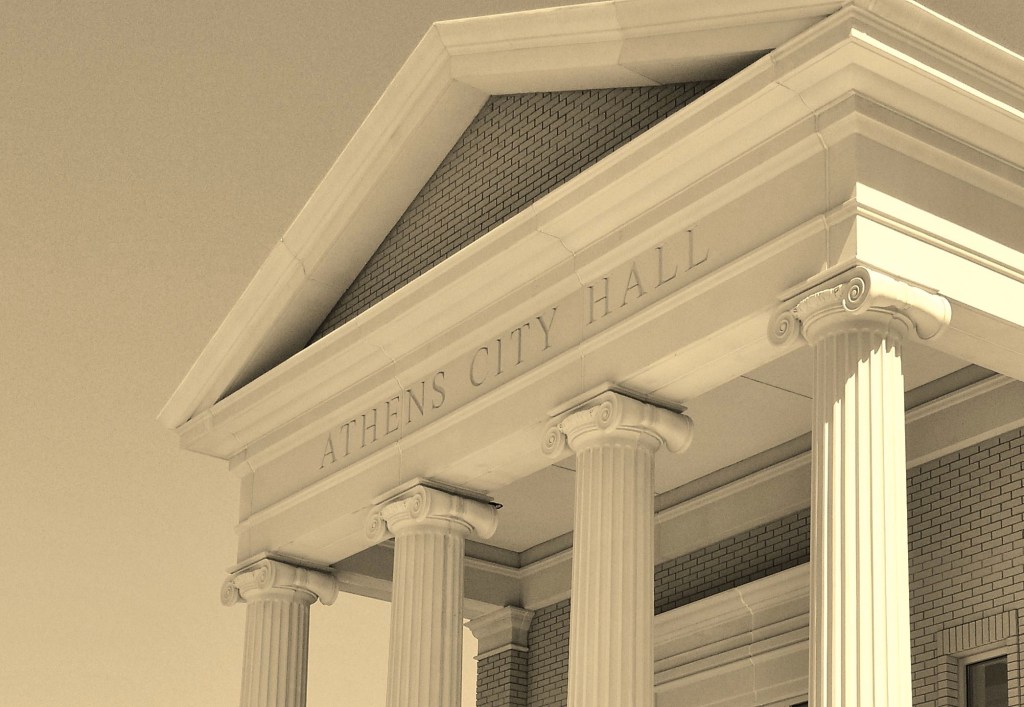City coffers showing signs of shutdown
Published 6:00 am Saturday, May 16, 2020

- Athens City Hall
Athens Mayor Ronnie Marks says the city’s financial recovery from the coronavirus pandemic won’t be a short one.
Figures released Friday morning show city sales tax revenue from this April is up 2% compared to last April. While that may sound like good news, it isn’t so great.
Trending
“For the past three or four years, sales tax revenue has grown 3% to 5% each year,” Marks told The News Courier Friday.
“We just ran the April numbers, and overall, we are up in sales tax by about 2%,” Marks said. “That’s mainly because of the big box stores.”
Big box stores such as Walmart and Lowe’s were allowed to remain open under Gov. Kay Ivey’s stay-at-home order because they were deemed “essential retailers.” Many small businesses balked at this, noting Walmart could continue selling clothing (in addition to food and cleaning supplies), while they could not.
Other taxes
While revenue from the big box stores helped the city weather the shutdown from a sales tax standpoint, other taxes did not fare so well.
On Monday, hotels were running at 30% capacity when they normally run at 70%, Marks said, noting that is also a revenue stream for the city. Lodging tax generated $110,900 last April compared to $68,700 this April.
Trending
The dollar surcharge the city adds to hotel rooms to generate money for tourism-related activities generated about $18,000 last April compared to $12,000 this April. Meanwhile, the gasoline tax generated $25,300 last April compared to $9,400 this April.
“So, you can see the impact we are talking about,” Marks said. “If people don’t travel, they don’t buy gasoline, they don’t lease hotel rooms and they don’t pay the surcharge on the rooms.”
May figures on sales, lodging and gasoline taxes and the hotel room surcharge for tourism will be available next month and should give city officials a better view of the damage caused by the coronavirus shutdown.
While the mayor said he has not seen all the numbers, he said, “This is a downward spiral. This is going to go on a while. I hope and pray it finds some way of leveling out. I can try to stay as optimistic as I can, but I don’t see a short recovery time.”
Small business woes
Declining sales tax revenue is not the only bad news. Although Marks said he worries most about the “health and safety of citizens,” he also worries about small business owners and their employees.
“That’s what led us to try to be creative about downtown restaurants,” the mayor said.
On Monday, the mayor and City Council agreed to let downtown restaurants apply to temporarily turn parking spaces into outdoor dining sites called “parklets.” The goal is to give owners more space to serve customers and customers more peace of mind about dining out.
Allowing this for a few weeks will let restaurant owners make up for having to limit the number of customers at one time and space tables 6 feet apart to prevent virus transmission.
“We are trying to be as creative as we can to help small business owners make a living and get their employees back to work,” Marks said. “Those are the people who are hurting.”
Workers cut
Marks said he temporarily cut part-time and temporary workers while the city waits for financial damage estimates for May.
“That’s why I’ve let off people and why I’m trying to be proactive by cutting nonessential people,” he said. Currently, department heads have to come to the mayor and human resources to explain why they might need a part-time person, such as a mower for the cemeteries.
Marks is extremely worried about the uptick in COVID-19 cases in the state since Gov. Kay Ivey relaxed the stay-at-home order May 11, which allowed more businesses to open.
At noon Friday, Alabama reported 11,216 COVID-19 cases and 476 COVID-19 deaths.
Limestone County has had 64 confirmed cases and no deaths.
“Not to preach doom and gloom, but this thing is far from over,” Marks said.





